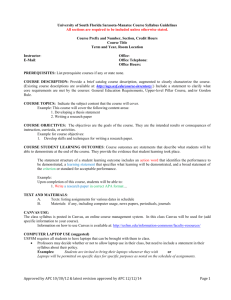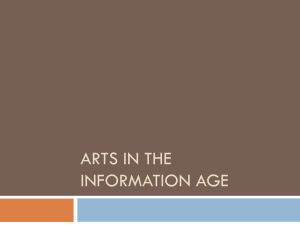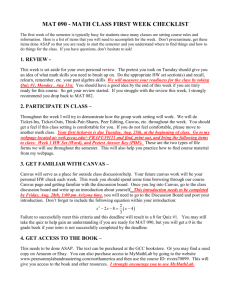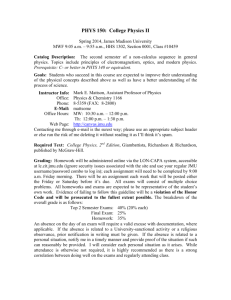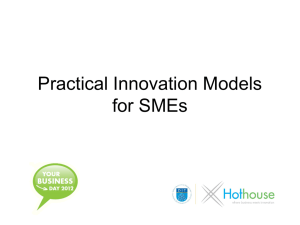Intermediate Financial Accounting I ACG 3103 – Fall 2013
advertisement
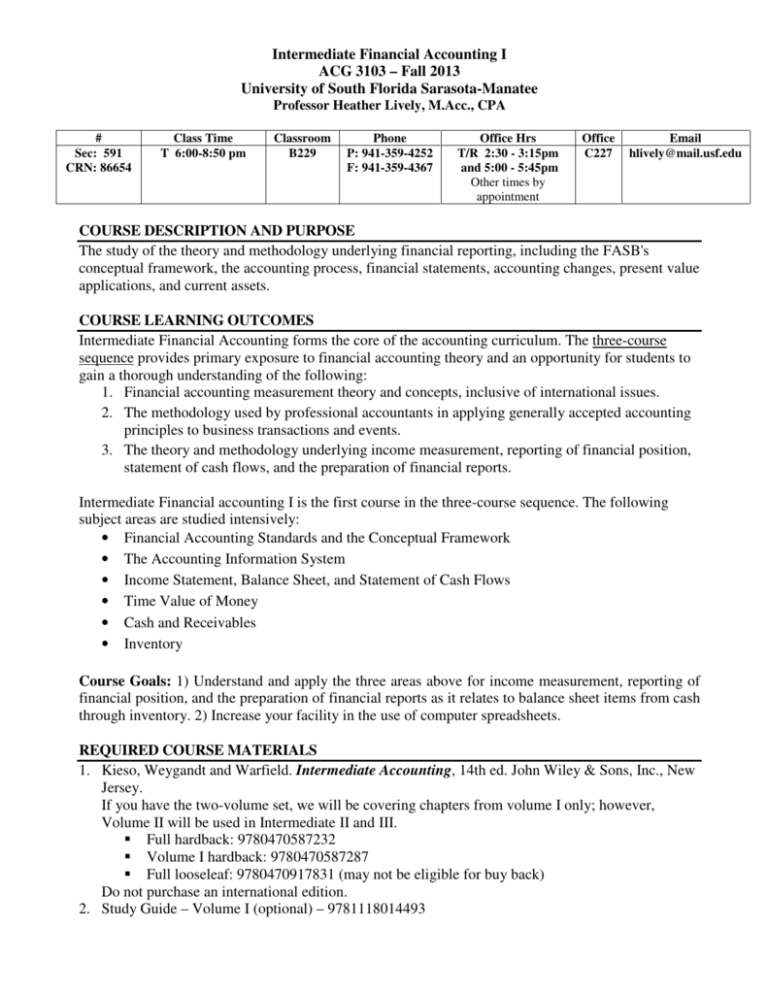
Intermediate Financial Accounting I ACG 3103 – Fall 2013 University of South Florida Sarasota-Manatee Professor Heather Lively, M.Acc., CPA # Sec: 591 CRN: 86654 Class Time T 6:00-8:50 pm Classroom B229 Phone P: 941-359-4252 F: 941-359-4367 Office Hrs T/R 2:30 - 3:15pm and 5:00 - 5:45pm Other times by appointment Office C227 Email hlively@mail.usf.edu COURSE DESCRIPTION AND PURPOSE The study of the theory and methodology underlying financial reporting, including the FASB's conceptual framework, the accounting process, financial statements, accounting changes, present value applications, and current assets. COURSE LEARNING OUTCOMES Intermediate Financial Accounting forms the core of the accounting curriculum. The three-course sequence provides primary exposure to financial accounting theory and an opportunity for students to gain a thorough understanding of the following: 1. Financial accounting measurement theory and concepts, inclusive of international issues. 2. The methodology used by professional accountants in applying generally accepted accounting principles to business transactions and events. 3. The theory and methodology underlying income measurement, reporting of financial position, statement of cash flows, and the preparation of financial reports. Intermediate Financial accounting I is the first course in the three-course sequence. The following subject areas are studied intensively: • Financial Accounting Standards and the Conceptual Framework • The Accounting Information System • Income Statement, Balance Sheet, and Statement of Cash Flows • Time Value of Money • Cash and Receivables • Inventory Course Goals: 1) Understand and apply the three areas above for income measurement, reporting of financial position, and the preparation of financial reports as it relates to balance sheet items from cash through inventory. 2) Increase your facility in the use of computer spreadsheets. REQUIRED COURSE MATERIALS 1. Kieso, Weygandt and Warfield. Intermediate Accounting, 14th ed. John Wiley & Sons, Inc., New Jersey. If you have the two-volume set, we will be covering chapters from volume I only; however, Volume II will be used in Intermediate II and III. Full hardback: 9780470587232 Volume I hardback: 9780470587287 Full looseleaf: 9780470917831 (may not be eligible for buy back) Do not purchase an international edition. 2. Study Guide – Volume I (optional) – 9781118014493 3. Computer use for internet research, word processing, Canvas access, and spreadsheet (Microsoft Excel) preparation. 4. Additional materials, such as PowerPoints or handouts, may be posted on Canvas throughout the semester. I will make every effort to post items required for class by 10 PM the night before class (Mondays). You are responsible for checking Canvas and printing all necessary materials for class. All supplementary material represents intellectual capital property of the professor and may not be copied or sold without the express permission of the professor. PREREQUISITES Students must have completed ACG 2021 and 2071 with a “C” or better (not C-). GRADE INFORMATION: Course grades will be assigned based on total points earned: Point Allocation Exam I 100 points Exam II 100 points Final Exam 100 points Quiz on Ch 1 & 2 10 points Financial Stmt Project 10 points Bank Rec Project 10 points Excel Assignment 15 points Memberships & Future Me 5 points Total Possible Points 350 points Grade & % A = 90 -100% B = 80 – 89.9% C = 70 – 79.9% D = 60 – 69.9% F = < than 60% Note: No grades in this course will be curved. Additionally, the +, - system will not be used; however the professor reserves the right to grant + or - grades in extreme borderline letter grade situations. + or - grades would only be given to help a student and never to hurt their grade. The professor reserves the right to modify the point allocation including adding or taking away assignments if necessary. HOMEWORK & ASSIGNMENTS Professional Memberships: A) AICPA Student Membership: It is now FREE to join! When you join, you MUST check the box at the bottom to join the AICPA (pasted below), otherwise you will only be signing up for the student online community and you will not receive credit for joining. https://community.thiswaytocpa.com/user/createuser.aspx?ReturnUrl=%2Fuser%2Fjoinaicpa.aspx Select YES in this box ↓ when completing your application online. Just think—someday you could look back on this moment as the pivotal point in your entire career. Unless, of course, you check the wrong box. Yes, please No, thanks To receive class points you must do two things: (1) (1 point) Print your membership info and turn into Professor Lively. See Canvas for an example member letter. (2) (3 points) Build your future me (startheregoplaces.com). Pick at least three of the recommended professions and find at least one company name and address for each selected profession where you could do that job in the city you are hoping to work after getting your CPA. B) FICPA Student Membership (1 point): It is now FREE to join! Print your membership info and turn into Professor Lively for class points. See Canvas for an example member letter. http://www.ficpa.org/Content/FutureCPAs/Students/Majors/Membership.aspx Excel Assignment: You will be assigned one Excel assignment during the semester. Assignment instructions will be provided in a separate handout on Canvas during the semester. F/S and Bank Rec Projects: You will be assigned two projects during the semester. Assignment instructions will be provided in a separate handout on Canvas during the semester. Homework: Homework will be assigned weekly and may include review questions, multiple choice questions, discussion problems, and cases. I expect for you to make an honest effort to complete each homework assignment before we cover it in class. In this course, if you cannot master the homework, you will likely not pass the class. To encourage that you stay on top of homework, I may check homework at the beginning of class on a surprise basis throughout the semester for extra credit. Every homework problem assigned for that day must have been attempted to earn credit for the homework check. If you come in after I have finished checking homework or miss class that day, you will not receive credit for that check. There will be no makeups for a missed homework check. If you know you will miss class or be late a particular day, it is best to submit your homework before class begins either in person (to the COB receptionist or Professor Lively) or by email to hlively@mail.usf.edu. There is no set number of checks. Late Assignments: Assignments are due by the date/time listed on the syllabus. Due dates may not be normal class days/times, so pay close attention and keep track of due dates. An assignment will be counted late if it is submitted into Canvas after the deadline or if assignments have already been collected in class and the lecture has begun. Late assignments are penalized a letter grade for each day or portion of day late. There will be no exceptions to this rule for reasons such as faulty internet connection, slow upload, etc. You are strongly encouraged to submit assignment before the deadline to allow for technology or other unexpected issues. Extra Credit: See “Homework” above for an extra credit opportunity. There is also a small amount of extra credit built into every exam. Additionally, I may offer extra credit for attendance at any USFSM Accounting Society Event. This will be announced in class or on Canvas before any event. Occasionally, I may award additional extra credit for class work, attendance, or homework not specified on this syllabus. This is up to and given at the discretion of the professor. There is no makeup for extra credit. If you are unable to attend an AS event or take part in any additional extra-credit the professor may assign throughout the semester, you simply miss out. EXAM POLCIES AND MAKEUP EXAMS Exams will be comprised of a combination of question formats including multiple choice, true/false, short answer, short essay, problems, etc. Time will not always permit the discussion of all assigned text material and/or problems during class sessions. You are responsible for the assigned text material and homework problems, regardless of whether they are covered during class. The final exam may include any information from the first two examinations that I feel needs to be re-addressed. I will inform you in advance of any such topics. Students are responsible to be there on time. No time extensions will be made for being late. In the event of a missed exam, a score of zero will be assigned. If the student must miss an exam but contacts me prior to missing the exam, and has a valid excuse (as determined by the professor), no makeup exam will be given, but the student will be able to take a comprehensive final exam. An interview, car failure, travel, and work are not acceptable reasons and no makeup exam will be allowed for these excuses. A doctor’s excuse will be requested to validate an excuse of illness. GRADING OF ASSIGNMENTS AND EXAMS I will make every effort to grade exams within one week so that we can review the answers in class. Exam scores will not be posted on Canvas until the exams have been reviewed in class. Students have 1 week from the time an assignment or exam is returned to question grading. After that, you may still review your exam or assignment; however, grades will not be adjusted. A student who is absent on the day an exam or assignment is returned is not exempt from the 1-week rule. Students who are not able to comply with the 1 week rule must contact the instructor as soon as possible to explain the circumstances. For example, a student who must return home for family reasons and who will be absent for several days, including the day an exam is scheduled to be returned, should inform the instructor, who will then make suitable arrangements for the student to have a fair chance to review his/her exam. Office hours are the best time to leisurely review your exam. If office hours do not work, a mutually convenient time will be found. Students may spend time reviewing their exams and assignments in the instructor's office either during office hours or during a scheduled appointment. Exams are retained by the instructor for a minimum of two weeks into the next semester and then destroyed. Anyone failing to return a test to the instructor at the end of the test or at the end of the class when the test is returned, will face the prospect of receiving a zero on the test or an honor code violation, if warranted. DISCLOSURE OF GRADES Due to confidentiality issues, grades will not be released via email or telephone. Do NOT email me about grades. Instead, you may email me to setup an appointment to discuss your grades in person or simply come by office hours. Exams 1 and 2 will be posted on Canvas after the exams are gone over in class. The final exam will be posted within 1 week of the testing date. Students will have one week after final exam scores are posted on Canvas to schedule an appointment with me to review their final exam before the grade is considered final. All other grades will be posted on interim dates throughout the semester. It is your responsibility to ensure grades on Canvas are correct. All students may come by during office hours to view their grades and status in the course. WITHDRAWAL/DROP No “W” grades can be obtained after the official drop date of Saturday, November 2nd at 5pm. All students enrolled after the drop date will receive a letter grade of A, B, C, D, or F. INCOMPLETE (I) GRADES An “I” grade may be awarded to an undergraduate student only when a small portion of the student’s work is incomplete due to circumstances beyond the control of the student and only when a student is otherwise earning a passing grade. “I” grades are to be used only in emergency situations. “I” grades are not to be used as a means of avoiding a poor grade. HONOR SYSTEM Under the USF Honor System, each student is expected to observe complete honesty in all academic matters. Violation of the Honor System is considered unacceptable behavior and will be referred to the Honor Council. Violations of the Honor Code include, but are not limited to, the following: any form of plagiarism, copying another student’s homework or test answers, signing another student’s name on the attendance roster, copying another group’s written work, misrepresenting a reason for a missed exam, bringing materials including text stored in an electronic devise to an exam, any kind of cheating on exams, projects, or papers. All students involved, even those who allow their work to be copied, will be disciplined within the guidelines of the USF Honor Code. The instructor may use software to assess potential plagiarism. Sources must be properly cited (including electronic resources). The University’s policy on academic dishonesty and disruption of the academic process are clearly set forth in the USF undergraduate catalog (http://www.usfsm.edu/catalog/undergraduate/) or Code of Conduct (http://www.sa.usf.edu/srr/page.asp?id=88). Punishment for academic dishonesty may result in an automatic “F” or “FF” in the course or action that may result in suspension or expulsion. An accountant with an ethical violation on their college transcripts would have a difficult time finding a job. Don’t ruin your career over a few points in a class. It’s just not worth it. PLAGIARISM SOFTWARE The University of South Florida has an account with an automated plagiarism detection service which allows student assignments be checked for plagiarism. I reserve the right to ask students to submit their assignments to Turnitin through Canvas. Assignments are compared automatically with a database of journal articles, web articles, and previously submitted papers. The instructor receives a report showing exactly how a student’s paper was plagiarized. PLEASE REMOVE YOUR NAME FROM THE BODY OF YOUR PAPER AND REPLACE IT WITH YOUR USF ID#. ALSO REMOVE YOUR NAME FROM THE FILE NAME AND REPLACE IT WITH YOUR USF ID# (e.g., “U12345678 Essay 1.docx”) BEFORE SUBMITTING IT TO TURNITIN. Pursuant to the provisions of the Family Educational Rights and Privacy Act (FERPA), students are requested to maintain confidentiality as a way to keep their personal contact information (i.e. name, address, telephone) from being disclosed to vendors or other outside agencies. By your submission, you are also agreeing to release your original work for review for academic purposes to Turnitin. NOT PROPERLY ENROLLED Students who are not properly enrolled in the class (such as for failure to pay fees) will not be allowed to take examinations unless written documentation is provided that the problem has been resolved. S/U GRADES No upper level accounting course may be taken on an S/U basis. CLASS INFORMATION: RELIGIOUS OBSERVANCES USFSM recognizes the right of students and faculty to observe major religious holidays. Students who anticipate the necessity of being absent from class for a major religious observance must provide notice of the date(s) to the instructor, in writing, by the second week of classes. DISABILITIES Disabilities Accommodation: Students are responsible for registering with the Office of Students with Disabilities Services (SDS) in order to receive academic accommodations. Reasonable notice must be given to the SDS office (typically 5 working days) for accommodations to be arranged. It is the responsibility of the student to provide each instructor with a copy of the official Memo of Accommodation. Contact Information: disabilityservices@sar.usf.edu Disability Coordinator: 359-4714 http://www.usfsm.edu/students/disability/ ATHLETES Any athlete in which their sport will affect attendance of this course must provide by the second week of class, a schedule of any missed classes and exams as well as a schedule from the USF Athletics website and note from the coach giving evidence of missed classes. FIRE ALARM INSTRUCTIONS At the beginning of each semester please note the emergency exit maps posted in each classroom. These signs are marked with the primary evacuation route (red) and secondary evacuation route (orange) in case the building needs to be evacuated. For more information, please refer to the University’s Emergency Evacuation Procedures (http://www.sarasota.usf.edu/Facilities/documents/EAP_FAQ.pdf). ACADEMIC CONTINUITY PLANNING In the event of an emergency, it may be necessary for USFSM to suspend normal operations. During this time, USFSM may opt to continue delivery of instruction through methods that include but are not limited to: Canvas, Elluminate, Skype, and email messaging and/or an alternate schedule. It is the responsibility of the student to monitor the Canvas site of each class for course specific communication, and the main USFSM and College of Business websites, emails, and MoBull messages (http://www.mobull.usf.edu/) for important general information. The USF hotline at 1 (800) 992-4231 is updated with pre-recorded information during an emergency. See the Safety Preparedness Website (http://www.sarasota.usf.edu/facilities/SafetyPreparedness.php) for further information. LECTURE NOTE SALES In accordance with Chapter 5 of the USF Faculty Handbook (1998), students or other individuals may not take notes or tape lectures for the purpose of selling said materials. Class notes/tapes are only for the personal use of each student officially enrolled in the course. You must receive advance permission from the professor to audio record any lecture. Video recording is not permitted. OFFICE HOURS Office hours are as shown on page 1. Students are encouraged to seek individual assistance during office hours as needed. If a student has a conflict with office hours, a mutually convenient time will be worked out on an individual basis. USE OF ELECTRONIC EQUIPMENT Use of electronic equipment for purposes other than the current topic of class discussion is extremely disruptive to your fellow students and to me. It also diverts your attention from class. Notebook computers or tablets may be used to take notes or access lecture materials. They may not be used to access the Internet, to play games, to work on tasks unrelated to this class, etc. Cell phones may be left in silent mode if it is imperative that you be reached during class due to an emergency situation. They may not be used to send text messages or to play games at any time. During an exam, your phone must be turned off, out of sight, and should not be used for any reason, either inside or outside of the classroom. I reserve the right to inspect all electronic equipment used in class, as well as to ask that use be discontinued. CLASS PARTICIPATION AND PROFESSIONALISM The University does not tolerate behavior that disrupts the learning process. The policy for addressing academic disruption is included with Academic Dishonesty (see links to catalog and code of conduct provided in Honor System section). Students are expected to attend class and participate in class discussion where appropriate and/or when called on. Further, students are expected to conduct themselves at all times in a professional manner, including regular class attendance, alertness and interest in the class. Unprofessional behavior includes, but is not limited to, being late for class, talking to other students excessively, leaving class, sleeping in class, violations of the electronic equipment policy (above), or engaging in any other behavior that is disruptive or disrespectful to the professor or class. Students will 6 have one free warning and then unprofessional behavior will result in a 10-point deduction from the student’s total points. Students will be notified if this occurs. CANVAS/USF EMAIL Canvas is the official communication for this course. Please check it frequently. Information on how to use Canvas is available at: http://www.usfsm.edu/infocommons/students.php Students are responsible for knowing about changes announced on Canvas (this includes during inclement weather or other unforeseen obstacles which may postpone or cancel our normal class meeting). The instructor reserves the right to make changes to the course when necessary. Students should set their Canvas preferences to receive an email when an announcement is posted; however, due to occasional email problems, it is best to check Canvas at least 3 times per week. I expect every student to have access to their USF email and to check it regularly. Email is generally the best way to get in touch with me, and I will make every attempt to answer emails within 24 hours, Monday - Friday. Accessing Canvas: You must have a USF NetID to access Canvas. Students receive official USF correspondence and Canvas course information via that address. You can set up your NetID at https://una.acomp.usf.edu/. After setting up your NetID, you can access Canvas at https://my.usf.edu/. All grades will be posted on Canvas as soon as possible. Once you are able to access Canvas, you can change the default e-mail account to any account you wish. It is imperative that you do so if you do not plan to use your USF mail account. You are responsible for any email I send to you through Canvas. This class requires the use of the Internet and e-mail. If you do not possess an e-mail account, you should obtain one from academic computing. To set up an email account online go to: https://una.acomp.usf.edu. CALCULATORS AND PARTIAL CREDIT Only non-programmable calculators (basic 4 function, scientific, or financial) may be used during exams. However, to obtain partial credit on problems you must show all of your supporting computations. No sharing of calculators is allowed. Calculators that can store equations, formulas, and/or written text in memory (graphing calculators, etc.) are not allowed during exams or quizzes. Cell phones, iPods, laptops, or any other electronic device with calculator or formula/text storage functions are not permitted for students to have or use on exam dates. If you have questions whether something is allowable, please be sure to check with me in advance. Any attempt to use a type of calculator that is not allowed will be considered a violation of the academic honesty policy. You are responsible for bringing an appropriate calculator to all exams. ATTENDANCE Students are expected to attend classes regularly and attendance will be taken. Students are responsible for any material missed. I recommend asking a classmate regarding missed classwork. If you e-mail me, I will let you know of any special information that was disclosed in class that day; however, I will not re-teach the information during office hours. WAYS TO SUCCEED IN THIS COURSE This is a very difficult course with a large amount of material to cover. The focus of the course is the chapter learning objectives. The power points, homework, and exams are all focused on the learning objectives. The exams will emphasize your analytical ability to digest the subject matter. The homework assignments are to be used as a study aide for you. The solutions will be posted on Canvas after we go over the homework in class. I strongly urge you to read the chapter and try to do the homework prior to the class period it’s assigned. This will allow you to ask questions that will help you understand the material. Your role is to learn the material. My role is to help you do so, not to spoon 7 feed you, but to answer your questions and help make the material understandable. I will try to concentrate on the most difficult subject matter not all the subject matter in the learning objectives. You are responsible for all the learning objectives. Class lectures will cover: • • • • • • The most difficult concepts and homework problems in the chapters’ learning objectives, based on my opinion. Any questions you have in regard to topics covered in the learning objectives. Any questions you have on homework or case assignments. Other learning objectives as time allows. Any questions you have on topics not covered in the learning objectives. If time is short I will answer your questions outside of class time. Any other accounting topics as time allows. If time is short I will answer your questions outside of class time. When asked, “How should I study?” this is my typical response: I highly recommend that each week you first read the chapter assigned making sure to work through each example, understanding why they debited this or credited that. Take notes during the in-class lecture. After class, work the assigned homework, even if at times it is frustrating or you feel you are lost – That’s ok! You need to continue to train yourself to think analytically which takes practice! If you find you are struggling with the homework, look back to the examples in the chapter or PowerPoint. We will go over most of the homework in class the following week. If you have not attempted the homework prior to our class discussion, you will benefit minimally from merely listening to the answers discussed in class. When the homework is gone over in class, circle, highlight, or make not of any areas you had trouble with. After class, go back and re-work any problems with which you had trouble, without using your notes or homework solutions until you have given an honest effort to solve everything on your own. Prior to the exam, re-work the homework again, under time pressure (posted homework solutions indicate a time suggestion), and without notes homework solutions (do check your work afterwards, going back through any areas you solved incorrectly). Review your notes and PowerPoint slides after each class and again before the exam, going back to the textbook for any areas you couldn’t explain to another person. Focus on the learning objectives provided in a handout on Canvas. If you can do all those, you should be well prepared for the exam. Lastly, please email me or come to office hours with any difficulties you are having, as soon as they arise (not a week before the final when you need a 98% on the exam to pass the class. . .). 8 COURSE SCHEDULE Note: I reserve the right to modify the schedule below if necessary. You are responsible for checking Canvas for additional assignments and keeping track of the assignments/due dates listed here and on Canvas. Excel templates for some homework is available on the publisher’s companion website (http://bcs.wiley.com/he-bcs/Books?action=index&bcsId=6326&itemId=0470587237). Homework Key: CE: Codification Exercises P: Problems FRP: Financial Reporting Q: Questions CA: Concepts for Analysis Problem BE: Brief Exercises FSA: Financial Statement IFRS: International Reporting E: Exercises Analysis Case Case Day/Date T 8/27 T 9/3 T 9/10 Text Chapter and Topic (read prior to class) Course Introduction & Syllabus review Ch 1 – Financial Accounting and Accounting Standards Ch 2 – Conceptual Framework for Fin. Accounting Ch 3 – The Accounting Information System (including Appendix A, B, and C) T 9/17 Quiz: Chapters 1 & 2 T 9/24 Ch 4 – Income Statement and Related Information Note: The section on Comprehensive Income (pg 181) is no longer current GAAP. Replacement pages have been posted on Canvas. Ch 5 – Balance Sheet and Statement of Cash Flows DUE: AICPA/FICPA/Future Me Homework (attempt prior to class) Ch 1 HWMK CE: 1 Q: 4, 6, 15, 17, 20, 24, 27 CA: 1, 3, 12, 18 Ch 2 HMWK Q: 1-9, 12, 18, 19, 21, 28 E: 4, 6, 9 Ch 3 HMWK Q: 2, 3, 7, 16, 18, 19 E: 1, 5, 7, 10, 12 (omit b1), 18 P: 2 (also prepare closing entries and a post-closing trial balance) Ch 4 HMWK CE: 2 Q: 2, 6, 10, 12, 14, 16, 21, 26, 27, 30 BE: 5, 7, 10 E: 4, 13 P: 3 Extra Practice: P-7 HWMK from Updating Supplement Q: 34 BE: 11 E: 16 9 Day/Date T 10/1 T 10/8 T 10/15 Sun 10/20 T 10/22 T 10/29 Sat 11/2 T 11/5 T 11/12 T 11/19 T 11/26 T 12/3 Text Chapter and Topic (read prior to class) Homework (attempt prior to class) Ch 5 HMWK CE: 1 Q: 4, 6, 9, 21, 23, 24, 25 E: 1, 3, 7, 10, 12, 13, 18 Extra Practice: E-17, P-2 No Class: Financial Statement Project Due Electronically Exam I (Ch 3, 4, 5) – No graphing calculators, hats, visible cell phones or course materials. Bring #2 pencils, eraser, sharpener, and appropriate calculator. Excel Assignment Due in Canvas no later than 8PM on Sunday 10/20. I will answer all emailed questions that are received by Friday, 10/18 @ 8PM. Ch 6 – Accounting and the Time Value of Money (Omit Learning Objective 9) Ch 7– Cash & Receivables (including Appendix A) Ch 6 HMWK (Omit Learning Objective 7) Q: 3, 6, 9, 13, 17 E: 2, 6, 8, 9, 12, 18, 19 P: 2 Extra Practice: E- 3, 4, 5; P- 1 Drop Deadline - 5PM Ch 7 HMWK CE: 2 Q: 2, 8, 9, 15, 19, 23 BE: 2, 3, 6, 7 (you do not need to calculate the amount of interest revenue, but do show the journal entries), 16 E: 2, 4, 8, 9, 13, 16, 17, 20, 22, 25 P: 3 Extra Practice: E- 8, 9, 12; P- 2 Bank Reconciliation Project Due at the Beginning of Class Exam II (Ch 6, 7) – No graphing calculators, hats, visible cell phones or course materials. Bring #2 pencils, eraser, sharpener, and appropriate calculator. Ch 8– Valuation of Inventories (Omit Learning Objective 8) Ch 9 – Inventories: Additional Valuation Issues Ch 8 HMWK CE: 3 (Omit Learning Objective 6) Q: 4, 20 E: 2, 3, 13, 14 P: 6 Extra Practice: E-17, P-4 Ch 9 HMWK Q: 1, 4, 5, 7, 9, 10, 12, 18 BE: 9 E: 2, 4 (omit a & c), 8, 10, 16, 17 P: 2 ACG 3103 | Fall 2013 10 T 12/10 Final Exam – No graphing calculators, hats, visible cell phones or course materials. Bring #2 pencils, eraser, sharpener, appropriate calculator. Note: Exam and Course grades will be posted as soon as possible. Make sure your OASIS grade matches Canvas. You may make an appointment with me if you wish to discuss your grades or review your final exam. ACG 3103 | Fall 2013 11
